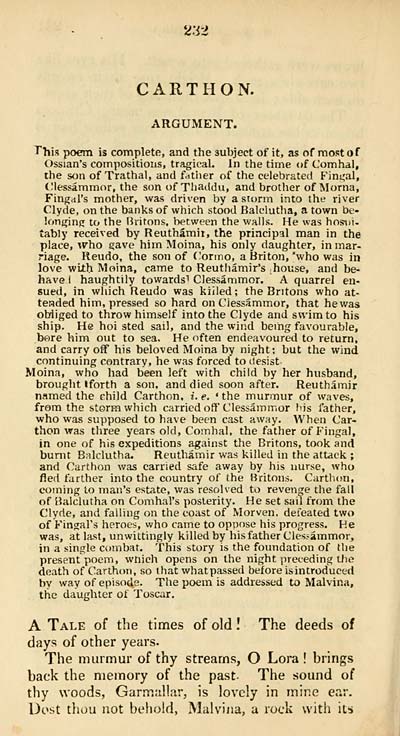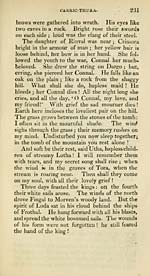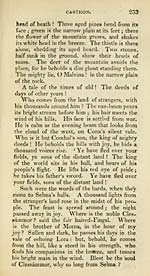Ossian Collection > Poems of Ossian
(244)
Download files
Complete book:
Individual page:
Thumbnail gallery: Grid view | List view

C A R T H O N.
ARGUMENT.
This poem is complete, and the subject of it, as of most of
Ossian's compositions, tragical. In the time of Comhal,
the son of Trathal, and fatlier of the celebrated Fint,'al,
(Messammor, the son of Tliatldu, and brother of Morna,
Fing.il's mother, was driven by a storm into the river
Clyde, on the banks of which stood Balclutha, a town be-
lonijinfj to the IJritons, between the walls. He was hosnii-
tably received by Reuthamii, the principal man in the
place, who £;ave him Moina, his only daughter, in mar-
riage. Reudo, the son of (Torino, a Briton, 'who was in
love with Moina, came to Reutliamir's .house, and be-
have 1 haughtily towards^ Clessammor. A quarrel en-
sued, in which Reudo was kiiled; the Britons who at-
tended him, pressed so hard on Clessammor, that hewas
obliged to throw himself into the Clyde and swim to his
ship. He hoi sted sail, and the wind being favourable,
bore him out to sea. He often endeavoured to return,
and carry off his beloved Moina by night; but the wind
continuing contrary, he was forced to tiesist
Moina, who had been left with child by her husband,
brought Iforth a son, and died soon after. Reuthamir
named the child Carthon, i. e. ' the murmur of waves,
from the storm which carried off" Clessammor bis father,
who was supposed to have been cast away. When Car-
thon was three years old, Comhal, the father of Fingal,
in one of his expeditions against the Britons, took and
bumt Balclutha. Reuthamir was killed in the attack ;
and Carthon was carried safe away by his nurse, who
fled farther into the country of the Britons. Carthon,
coming to man's estate, was resolved to revenge the fall
of iJalclutha on Comhal's posterity. He set sail from the
Clyde, and falling on the coast of Morven, defeated two
of Fingars heroes, who came to oppose his progress. He
was, at last, unwittingly killed by his father Clessammor,
in a single combat. This story is the foundation of the
present poem, which opens on the night preceding the
death of Carthon, so that what passed before is introduced
by way of episode. The poem is addressed to Malvina,
the daughter of Toscar.
A Tale of the times of old I The deeds of
days of other years.
The murmur of thy streams, O Lora ! brings
back the memory of the past. The sound of
thy woods, Garmullar, is lovely in mir.o ear.
Dost thou not behold, Malvina, a rock with its
ARGUMENT.
This poem is complete, and the subject of it, as of most of
Ossian's compositions, tragical. In the time of Comhal,
the son of Trathal, and fatlier of the celebrated Fint,'al,
(Messammor, the son of Tliatldu, and brother of Morna,
Fing.il's mother, was driven by a storm into the river
Clyde, on the banks of which stood Balclutha, a town be-
lonijinfj to the IJritons, between the walls. He was hosnii-
tably received by Reuthamii, the principal man in the
place, who £;ave him Moina, his only daughter, in mar-
riage. Reudo, the son of (Torino, a Briton, 'who was in
love with Moina, came to Reutliamir's .house, and be-
have 1 haughtily towards^ Clessammor. A quarrel en-
sued, in which Reudo was kiiled; the Britons who at-
tended him, pressed so hard on Clessammor, that hewas
obliged to throw himself into the Clyde and swim to his
ship. He hoi sted sail, and the wind being favourable,
bore him out to sea. He often endeavoured to return,
and carry off his beloved Moina by night; but the wind
continuing contrary, he was forced to tiesist
Moina, who had been left with child by her husband,
brought Iforth a son, and died soon after. Reuthamir
named the child Carthon, i. e. ' the murmur of waves,
from the storm which carried off" Clessammor bis father,
who was supposed to have been cast away. When Car-
thon was three years old, Comhal, the father of Fingal,
in one of his expeditions against the Britons, took and
bumt Balclutha. Reuthamir was killed in the attack ;
and Carthon was carried safe away by his nurse, who
fled farther into the country of the Britons. Carthon,
coming to man's estate, was resolved to revenge the fall
of iJalclutha on Comhal's posterity. He set sail from the
Clyde, and falling on the coast of Morven, defeated two
of Fingars heroes, who came to oppose his progress. He
was, at last, unwittingly killed by his father Clessammor,
in a single combat. This story is the foundation of the
present poem, which opens on the night preceding the
death of Carthon, so that what passed before is introduced
by way of episode. The poem is addressed to Malvina,
the daughter of Toscar.
A Tale of the times of old I The deeds of
days of other years.
The murmur of thy streams, O Lora ! brings
back the memory of the past. The sound of
thy woods, Garmullar, is lovely in mir.o ear.
Dost thou not behold, Malvina, a rock with its
Set display mode to: Large image | Transcription
Images and transcriptions on this page, including medium image downloads, may be used under the Creative Commons Attribution 4.0 International Licence unless otherwise stated. ![]()
| Early Gaelic Book Collections > Ossian Collection > Poems of Ossian > (244) |
|---|
| Permanent URL | https://digital.nls.uk/77575550 |
|---|
| Description | Selected books from the Ossian Collection of 327 volumes, originally assembled by J. Norman Methven of Perth. Different editions and translations of James MacPherson's epic poem 'Ossian', some with a map of the 'Kingdom of Connor'. Also secondary material relating to Ossianic poetry and the Ossian controversy. |
|---|
| Description | Selected items from five 'Special and Named Printed Collections'. Includes books in Gaelic and other Celtic languages, works about the Gaels, their languages, literature, culture and history. |
|---|

